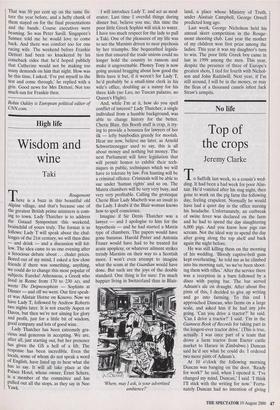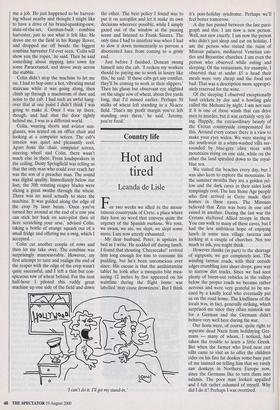No life
Top of the crops
Jeremy Clarke
T. Suffolk last week, to a cousin's wed- ding. It had been a bad week for poor Alas- tair. He'd vomited after his stag night, then gone to work on the pig farm the following day, feeling crapulent. Normally he would have had a quiet day in the office nursing his headache. Unfortunately, an outbreak of swine fever was declared on the farm and he had to spend the day slaughtering 6,000 pigs. And you know how pigs can scream. Not the ideal way to spend the day after going along the top shelf and back again the night before.
He was still killing them on the morning of his wedding. 'Bloody captive-bolt guns kept overheating,' he told me as he climbed into his morning suit, `so we've been shoot- ing them with rifles.' After the service there was a reception in a barn followed by a disco with paying bar. The bar served Adnam's ale on draught. After about five pints of this, I decided to give up writing and go into farming. To this end I approached Duncan, who farms on a large scale, and asked him if he had any jobs going. 'Can you drive a tractor?' he said. `Can I drive a tractor?' I said. 'I'm in the Guinness Book of Records for taking part in the longest-ever tractor drive.' (This is true, actually. I was once part of a team that drove a farm tractor from Exeter cattle market to Harare in Zimbabwe.) Duncan said he'd see what he could do. I ordered two more pints of Adnam's.
At 10 o'clock the following morning Duncan was banging on the door. 'Ready for work?' he said, when I opened it. 'I've changed my mind, Duncan,' I said. 'I think I'll stick with the writing for now.' Fortu- nately Duncan had no intention of giving me a job. He just happened to be harvest- ing wheat nearby and thought I might like to have a drive of his brand-spanking-new, state-of-the-art, German-built combine harvester, just to see what it felt like. He drove me to the field in his Range Rover, and dropped me off beside the biggest combine harvester I'd ever seen. 'Colin will show you the ropes,' he said. Then he said something about nipping into town for some Paracetamol, and drove away across the stubble.
Colin didn't stop the machine to let me on. I had to hop onto a hot, vibrating metal staircase while it was going along, then climb up through a maelstrom of dust and noise to the cab. I had such an awful hang- over that at one point I didn't think I was going to make it. Once I was up there, though, and had shut the door tightly behind me, I was in a different world.
Colin, wearing shorts and aviator sun- glasses, was seated on an office chair and looking at a computer screen. The cab's interior was quiet and pleasantly cool. Apart from the chair, computer screen, steering wheel and Colin, there wasn't much else in there. From loudspeakers in the ceiling, Dusty Springfield was telling us that the only man who could ever reach her was the son of a preacher man. The sound was digital quality. Immediately below our feet, the 30ft rotating reaper blades were slicing a great swathe through the wheat. There was no need actually to steer the machine. It was guided along the edge of the crop by laser beam. 'Once you've turned her around at the end of a row you can stick her back on auto-pilot then sit here scratching your arse,' advised Colin, taking a bottle of orange squash out of a small fridge and offering me a swig, which I accepted.
Colin cut another couple of rows and then let me take over. The combine was surprisingly manoeuvrable. However, my first attempt to turn and realign the end of the reaper with the edge of the crop wasn't quite successful, and I left a thin but con- spicuous row of wheat behind. For the next half-hour I piloted this ruddy great machine up one side of the field and down the other. The best policy I found was to put it on autopilot and let it make its own decisions wherever possible, while I simply gazed out of the window at the passing scene and listened to Frank Sinatra. The only time I had to interfere was when I had to slow it down momentarily to prevent a disoriented hare from coming to a grisly end.
Just before I finished, Duncan swung himself into the cab. 'I reckon my workers should be paying me to work in luxury like this,' he said. 'If these cabs get any comfier, they'll be coming to work in their slippers.' Then his glassy but observant eye alighted on the single row of wheat, about five yards long, that I'd missed earlier. Perhaps 50 stalks of wheat left standing in a 30-acre field. 'That's my profit margin you've left standing over there,' he said. 'Jeremy, you're fired.'



























































 Previous page
Previous page